|
Nil
By Mouth
London’s vintners, brewers and licensed
victuallers are already projecting a downturn in profits for the last quarter
of the year following the news that I will not be attending the usual round of
publishers’ Christmas parties. This is due to health, rather than legal,
reasons following a series of medical misfortunes which began in Italy in
September.

I had been busily researching venues
for a future Chianti Crime Fest in
the beautiful city of Verona and looking forward to a few days exploring the
Lake Garda region when I began to experience stabbing chest pains, the like of
which I had not known since the days when the Crime Writers’ Association gave
out voodoo dolls. Returning to England in time for the Autumn Season I was
initially diagnosed as having a ‘gastric virus’ but a second, more intelligent
doctor, demanded an investigation of my heart – usually my least vulnerable
spot.
Long story short, by the end of October
I was in hospital and soon transferred to the quite brilliant Cardiothoracic
Centre at Basildon University Hospital where I underwent a triple bypass
operation. On leaving the hospital I was given a short questionnaire
(seriously) asking whether I would recommend the hospital – Tripadvisor style - to
friends and family; which I certainly would most enthusiastically, if they had
cardiac problems. (As a venue for fine dining, art history, sightseeing or
water sports, it does leave a lot to be desired.)
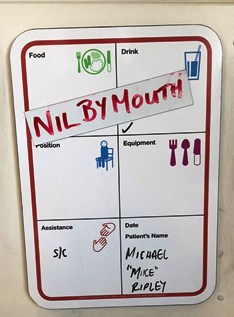
As a consequence, this month’s column
may appear a little below par but it will have to suffice. In the New Year a
firm decision on my retirement will have to be made and should I be forced to
quit the scene, the world of crime writing will no doubt mourn – at least until
the first set of Farewell Tour dates are announced.
Carter?
Got him.
I was aware of Ted Lewis’ famous 1970
novel Jack’s Return Home from an early age and knew it to be the
source of the iconic British gangster film Get
Carter, even though the film transposed the action northwards from the
shores of the Humber to those of the Tyne. However, I knew nothing about Ted
Lewis the author and have met only one crime-writer, the late Derek Raymond
(Robin Cook), who claimed to have come into contact with him.
Now Nick Triplow has produced a
biography, Getting Carter (No Exit Press), which may just bring Lewis
(1940-82) and his fiction back into the spotlight, and Triplow does a fine and
readable job despite having to work at times with rather thin source material.

I had assumed that Lewis’ crime writing
stemmed from his time on the mean streets of Soho in the 1960s (he worked as an
illustrator/artist on the Beatles’ cartoon Yellow
Submarine), but I learn that much of his inspiration for novels like Jack’s
Return Home (and two Jack Carter sequels), Plender and Billy
Rags were probably drawn from the pages of the Daily Express, which covered court cases on gangland crime
extensively in those days. (Although he is said to have visited Gerry's Club,
which may have provided an inspirational spark or two.)
I also had not realised that during his
most productive fiction-writing period (1970-1980), he lived a rural rather
than urban existence in darkest Suffolk and then on the grim, grey Lincolnshire
coast around Scunthorpe and Grimsby, often working in alcoholic isolation
sitting at the bar of a run-down country pub from the moment it opened. And I
was unaware that the iconic film Get
Carter was quickly remade as a Hollywood ‘blaxploitation’ movie, Hit Man, starring the wonderful Pam
Grier.
There are nuggets aplenty in Triplow’s
biography, but the place of Ted Lewis in British crime writing remains elusive,
although there is no doubting his influence on British noir fiction. He was certainly successful enough on the strength of
the film Get Carter to finance the
decade of drinking which contributed to his death at the age of 42, and to have
a bank account in Guernsey, but his novels have gone frustratingly in and out
of print in this country, though not so in the USA or France.
Yet Lewis’ own brand of hardboiled noir fiction was always going to be a
minority taste; noir normally is. At
the time he was writing, the bestseller lists were dominated by thrillers –
Frederick Forsyth, Jack Higgins and Robert Ludlum – the critical plaudits were
being won by spy fiction writers such as John Le Carré (Tinker, Tailor) and Anthony Price, and British crime writing was
seeing the emergence of P.D. James and Ruth Rendell as major forces. On
television, Z-Cars had been replaced
by The Sweeney and Callan by The Professionals. It was perhaps a decade too far to be telling
despondent stories of violent gangsters in unfashionable northern settings.
Was Jack’s
Return Home as influential as, say, William McIlvanney’s Laidlaw, published in 1977 (the same
year as the little-regarded Jack Carter
and the Mafia Pigeon)? Almost certainly not. Did Lewis’ career inspire a
new generation of hardboiled noiristas?
Probably not, or at least not on the scale which Derek Raymond did a decade
later.
Still, Ted Lewis does not deserve to be
forgotten and Nick Triplow’s biography will go a long way to ensuring that he
is not although he has magically disappeared from some of the key reference
works on the genre. The otherwise excellent Whodunit?
A Guide to Crime, Suspense and Spy Fiction edited by H.R.F. Keating in 1982
(the year of Lewis’ death) makes no mention of him at all and he is totally
absent from all three editions of Bloody
Murder (1972-1994) by Julian Symons.
Irish
Noir
I don’t know whether Irish writer Ken
Bruen was ever influenced by the books of Ted Lewis. Being a seriously literate
fellow, I am sure he will have read them at some point, but Ken’s style of
hardboiled noir is a world away from
that of Lewis. In fact, it’s a world away from anyone else’s style, for Ken Bruen is a total one-off.
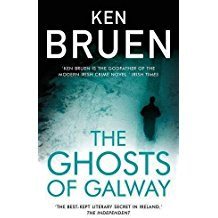
The prose in which he tells the stories
of ex-Garda detective Jack Taylor (Bruen’s series hero for more than a dozen
books and years, and splendidly played on television by Iain Glen), is stripped
back, often to one-word sentences which descend the page giving the impression
that the book is written in staccato blank verse. As the author is Irish, the
prose, however spare, is also poetic.
In The Ghosts of Galway, from publisher
Head of Zeus, Taylor is forced to interact with his least favourite tribe –
priests – initially to find a ‘rogue priest’ who claims to be in possession of
‘The Red Book’ a religious text from the 9th century considered by
the Church as heretical. It is, as Jack Taylor wryly observes: this little side trip down a Dan Brown alley.
In a hardboiled piece of noir, Ken’s
unique style probably shouldn’t work, yet it does, leavened with Irish whimsey
(though that sounds patronising, it isn’t meant to) and bits of homespun
philosophy such as: If the ghost of your
dead father comes to you, it is a sign of good things. If your dead mother
comes to you, get a Mass said. No, get many said. Wonderful stuff,
shoe-horning new vitality into an established sub-genre.
Flying
High
Second-had copies of Cyril Hare’s
detective story Suicide Expected can be bought for as little as 99p these days.
When I bought my copy of the 1958 Penguin edition, thirty years ago, it was
second-hand (or ‘pre-read’) and cost me 45p.
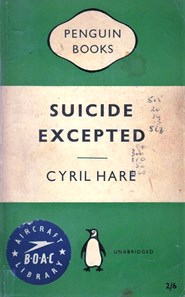
Now I have discovered a copy of exactly
the same book, in worse condition than mine, on sale on eBay for around £18.
Inflation? No, rather the fact that the one on eBay has a blue sticker
proclaiming it to have been part of the BOAC
Aircraft Library.
For younger readers, BOAC (British
Overseas Airways Corporation, which operated 1939-74) was the forerunner of
British Airways and a library was a fine institution which loaned books for
free. An ‘aircraft library’ is not something you will find on Ryanair, though
if they could charge for borrowings they may be interested in the concept…
Stark
Choices
I have, late in the day, discovered
that noble American publishing venture Start House which specialises in
reissuing ‘pulp’ mysteries, usually two per volume, many from the famous Gold
Medal paperbacks stable.
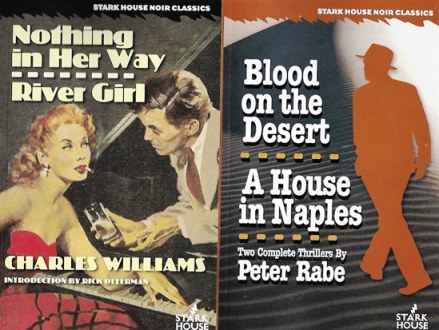
Recent Stark House titles have included
a double volume of novels from 1953 by the great Charles Williams – Nothing
in Her Way and River Girl (better known in the UK
as The
Catfish Tangle) – and two thriller by the less well-known (over here)
Peter Rabe; Blood on the Desert/ A House in Naples.
Early in the new year, and with an
introduction by the scholarly Bill Crider, Stark House publish a double volume
of novels by Richard Wormser: The Body Looks Familiar and The
Late Mrs Five from 1958 and 1960.
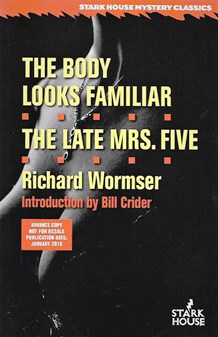

The prolific Richard Wormser
(1908-1977) wrote across many genres and is possibly best known here for his
westerns and, during the 1960s, a spate of ‘novelizations’ of popular movies,
including the Biblical epic Sodom and
Gomorrah. I have no idea if Richard
Wormser included it in his novelization, but the film’s script contains the
legendary warning: Beware the Sodomite
patrols.
|
|
Too English for the Brits?
Before being so rudely interrupted, my last task as an editor was an immensely pleasurable one, putting the finishing touches to new editions of three splendid crime novels by my old sidekick Walter Satterthwait for the Ostara Crime imprint.
There was a time, back in the early 1990s, when the much-travelled American resided in London, where he, the divine Sarah Caudwell and I formed an unlikely triumvirate on London’s boulevardier scene.
 
At the time, all three of us were published by the legendary Collins Crime Club, Walter’s fiction alternating between an excellent series of private eye stories set in Santa Fé and mysteries involving famous historical figures, most notably Lizzie Borden (she of the axe and forty whacks) and Oscar Wilde. They were literate, witty books and I was intrigued when I heard that his 1995 novel, Escapade, was to feature a new detective pairing of urbane Pinkerton man Ned Beaumont and the compulsive letter-writing (and wannabe-Pinkerton) English rose Jane Turner in a country house murder mystery set in 1921. Moreover, it was to be an English country house party at which the guests included escapologist Harry Houdini and the creator of Sherlock Holmes, Sir Arthur Conan Doyle.
It sounded to be just the sort of novel which would tick all my boxes and so I found it was when Walter sent me a copy of the American edition and to my delight discovered a (very) minor character in there called ‘Ripley’. I would recommended Escaped to all and sundry and waited eagerly for the UK edition … except there never was one; until now.
For some unfathomable reason, this most English of ‘Golden Age’ style mysteries with added tongue-in-cheek, failed to find a British publisher despite rave reviews in the USA and success in Germany (where all Walter’s books are highly regarded).
Two more adventures of ‘the Pinkerton Pair’ were to follow; Masquerade in 1998, set in Paris and guest-starring an incredibly clumsy Ernest Hemingway and a young British detective novelist famous for her novel The Mysterious Affair at Pyles, and then Cavalcade in 2005, set in 1923 Germany when the Pinkertons are hired by the Nazi party to investigate an assassination attempt on their new leader. (One of the suspects being, cheekily, an Englishman called Household…)
Once again, inexplicably, British publishers seemed disinterested until, that is, Walter gave me the chance to publish all three as trade paperbacks and eBooks for Ostara.
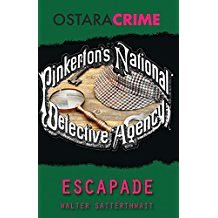
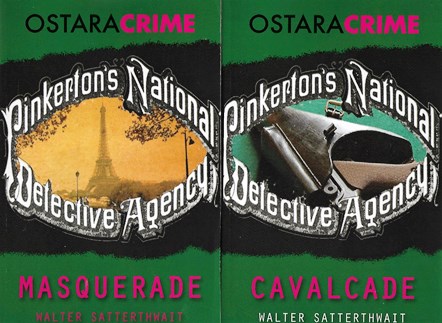
These are three of my favourite un-American mysteries written by an American, but then I would say that as I also appear (off-stage) in Cavalcade as a slovenly aggressive greengrocer from Torquay
A limited number of review copies of all three novels are available and should anyone fancy a treat, I can be contacted via the Ostara-publishing.co.uk website.
Back in The Jug Again
This year marks the 50th anniversary of one of the most enigmatic television shows ever made, a series which made Twin Peaks as straightforward as Murder She Wrote on occasion. The question is not whether or not you liked The Prisoner, but rather, did you understand it?

So what better time could there be for I Am Not A Number – decoding The Prisoner (Kamera Books), which goes through the series, episode by episode, the dissection of meaning and inference being conducted by ‘maverick British film maker’ Alex Cox? Having seen – and tried to understand – one of Alex Cox’s ‘maverick’ films, he seemed just the chap to unravel the mystery which, I have to admit, has not kept me awake for the last fifty years when I saw the show originally at roughly the same age as he did.
Books of the Year
During the ‘Summer of Spies’ promotion by Waterstones in Gower Street, London, on an evening devoted to ‘the master of the thriller’ Eric Ambler, I asked the question - just out of curiosity – if anyone could think of an Ambler novel set in England. No one could; England wasn’t exotic or lawless enough to be Ambler country.
I was reminded of that evening when choosing the crime novels I have personally most enjoyed this year, as not one is set in England, but rather wartime Germany and wartime Crete, Gibraltar, the south of France and the mountains of Umbria in Italy (okay, bits of that one do take place in England).
In no particular order, they were Philip Kerr’s Prussian Blue; The Road to Ithaca by Ben Pastor; Thomas Mogford’s A Thousand Cuts; Fatal Music by Peter Morfoot and Lone Wolf by Michel Gregorio.

Books of Next Year
I have only had chance to cast a twitching eye over next year’s new titles but it seems to be shaping up as a good year for modern spy fiction. First up, in January, is Killer Intent, a debut thriller by London barrister Tony Kent will be published by Elliot & Thompson. It threatens to be the first in a series and has been described to me as ‘Jack Reacher kicking over House of Cards’.
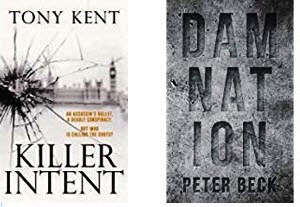
Another debut for both author and potential series hero, to be published in March by Point Blank is Damnation by Swiss businessman and economist Peter Beck. Described as ‘Jack Reacher meets George Smiley’ and set in the world of Swiss financial crime (who would’ve thought there was such a thing?), Peter Beck’s potential series hero is Tom Winter, the head of security for an elite (is there any other kind?) Swiss bank. Watch out from reviews headlined Winter Is Coming. I know I won’t be able to resist.
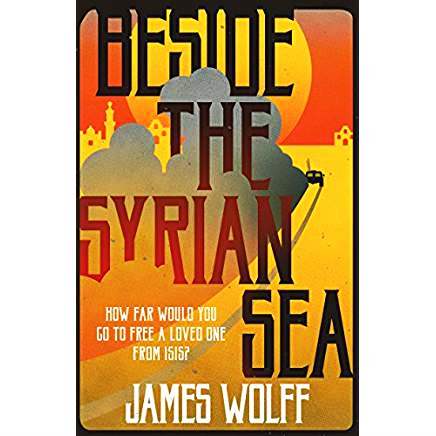
Although I have only read about ten percent of an advance proof, I am willing to stick my neck out and tip (or curse) Beside the Syrian Sea as one of the dark horses of 2018’s spy-fi output.
Yet another debut novel by a pseudonymous author who has ‘worked for the British government for the past ten years’ (we know what that means, don’t we?), under the name James Wolff, Beside the Syrian Sea is published in April by Bitter Lemon Press and features a British spy out in the cold mounting a private mission to rescue his father who has been kidnapped and held for ransom by ISIS in war-torn Syria.
From the start this has a ring of truth to the plot, tradecraft and setting (Ambler and Kim Philby country) and I suspect has been written by someone who has been there, done that and got the t-shirt, though of course never wears it.

Keep an eye out in 2018 for a new American hero, Peter Ash, in an excellent series of thrillers from Head of Zeus by Nick Petrie, the first of which, The Drifter, is now published. Peter Ash is a former US Army officer with his own PTSD, who, after violent tours of duty in Iraq and Afghanistan, now wanders the wide-open spaces of America (he has trouble with buildings) doing good and helping people, especially ex-servicemen and their families. Inevitably Peter Ash will be compared to Jack Reacher (though I’d rather have Reacher covering my back) but Lee Child has got in there first and generously blurbed the character as ‘the real deal’.

Fans of Cambridge-based Alison Bruce may despair that she has, temporarily, abandoned her policeman hero Gary Goodhew, but can take heart that she has kept the Cambridgeshire setting she observes so well in I Did It For Us which is published by Constable in January. This is a modern Cambridgeshire, which eschews college life and punting on the Cam (other than as tourist attractions) and concentrates on life on industrial estates and in new housing developments in outlying villages.
Alison’s new stand-alone novel begins with a rape trial and the narrator is the victim – or is she? What ensues is a forensic piece of domestic noir in which the reader is never quite sure whether the narrator is (a) reliable, (b) bat-shit crazy or (c) totally innocent, just a bit damaged.
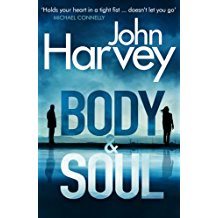
In April there will be new John Harvey novel published by Heinemann – hooray! It will feature John’s veteran former police detective Frank Elder and naturally I am looking forward to it, but I have another John Harvey thriller to read first as part of my continuing research into the boom in British thrillers in the 1960s and 70s.
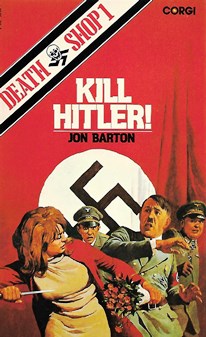
I refer of course to Kill Hitler! – the first in the ‘Death Shop’ series (there were two others) – written by a youthful John under the pen-name Jon Barton and published in 1976.
A Merry Christmas and
a Happy New Year to my Reader,
The RIPster (almost).
|